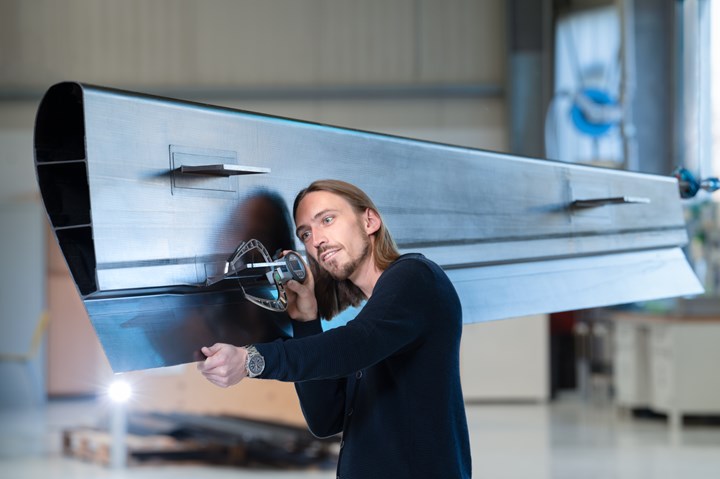FACC successfully develops novel composite flap system for Wing of Tomorrow
RTM’d five-meter-long, complex multicell flap prototype constructed via a highly integral, cost-effective manufacturing process.

FACC Wing of Tomorrow flap prototype. Photo Credit: FACC AG
In cooperation with Airbus (Toulouse, France) aviation and aerospace company FACC AG (Ried im Innkreis, Austria) says it is currently working on the Wing of Tomorrow (WOT) program, with the central goal to begin development of next-generation wing technologies, and make them ready for series production. FACC main focus is to develop innovative manufacturing processes to be employed in the production of three main wing components, which have fallen under three subprojects. The company recently completed development of an innovative flap, the second subproject.
“Joint research with leading international aircraft manufacturers is an important part of our innovation work,” reports Robert Machtlinger, CEO of FACC AG. “Our development engineers are researching new technologies and products for the next aircraft generations. One lighthouse initiative in this context is the Wing of Tomorrow program, which Airbus launched in 2018 in cooperation with FACC and other industry partners.”
FACC says its goal is to produce complex components in a faster, simpler and more cost-effective manner. The first subproject, the development of lower covers for wing boxes, was successfully completed in 2020. FACC’s second subproject involves construction of a flap prototype by means of resin transfer molding (RTM). Although this technique was already introduced in previous projects, FACC says, it has never before been applied on this scale and with such a high degree of complexity.
When developing the five-meter-long “multicell flap,” the focus was on sounding out technological possibilities. “With the new wing generation, Airbus is striving for a high degree of integration in order to reduce subsequent work steps as far as possible and thus become more cost-effective,” explains Patrick Petz, FACC lead program engineer for Aerostructures Airbus. “Integral construction enables us to avoid subsequent high assembly costs and thus achieve a high degree of maturity in manufacturing processes along with high rates.”
Apart from the complex construction method and the use of new materials (multiaxial fabrics), FACC says the tool design during production also proved to be a highly innovative feat. A multifunctional team comprising employees from Research & Development, Tooling and Program Management have been tackling this challenge for about a year, and recently presented the first component to the customer, Airbus. Next on the subproject list is the development of spoiler and droop panels.
“This represents a genuine milestone in our research cooperation with Airbus. We have jointly developed an entirely novel flap system,” says Machtlinger. “The wing component features a highly integral design; however, thanks to sophisticated solutions in terms of materials, processes and design, we are able to offer Airbus affordable lightweight construction while ensuring high suitability for series production.”
Related Content
-
3D-printed CFRP tools for serial production of composite landing flaps
GKN Aerospace Munich and CEAD develop printed tooling with short and continuous fiber that reduces cost and increases sustainability for composites production.
-
Thermoplastic composites welding: Process control, certification, crack arresters and surface prep
More widespread use of welded composite structures within a decade? Yes, but further developments are needed.
-
Plant tour: National Institute for Aviation Research, Wichita, Kan., U.S.
NIAR, located at Wichita State University in the heart of the American aerospace manufacturing industry, has evolved to become a premier hub of teaching, R&D, creativity and innovation.









.jpg;maxWidth=300;quality=90)



